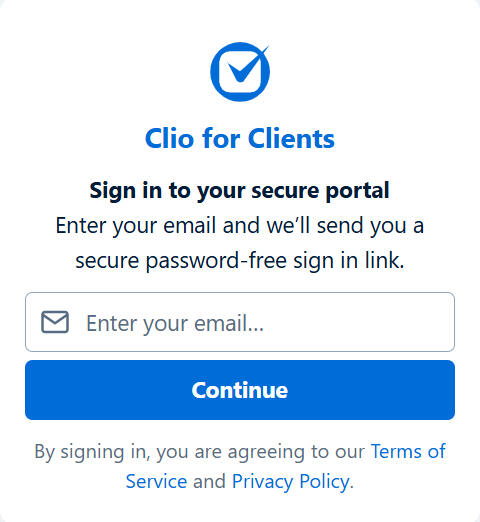CorePoint Law LLC:
Client Site

RESOURCES
PORTAL
https://clients.clio.com/login
• Check case status
• Make a payment
• Share documents
• Leave messages

PAYMENTS

INSTRUCTIONS
A. Using the Client Portal/AppEverything in your case - fees, expenses, trust balances - is available in the Client Portal that you can access through “Clio,” the firm’s practice management software.You access the Clio Portal online by clicking the link above, and registering using the email address which you provided to your attorney. The Clio Portal may then be accessed online or using the Clio for Clients app.The Clio Portal/App shows not only invoices and balances, but also has a built-in document sharing and messaging system. Clients may use this to share files, requests, schedules, deadlines, messages, and other items with their attorney.While it is not required to sign up for the Clio Portal or download the Clio Client app, many clients find it convenient, and it is encouraged.B. Using the Payment LinksIf you wish to make a retainer or deposit payment to your Trust Account, you may click on the link above to "Trust Deposit."If you wish to make a payment for an outstanding unpaid invoice, you may submit this via the link above to "Invoice Payments."These links utilize eCheck or Credit Card. If you prefer, payments may also be forwarded using Zelle or PayPal to: [email protected].
FAQ
1) What are the different fee structures used?Different types of case have different fee structures that are appropriate. Typically, they are hourly, contingency, flat-fee, or hybrid. Upon consultation, we may discuss which structure makes the most sense for your case.2) How does hourly billing work?Payments are made to a Trust Account at the beginning of the case ("retainer"), and periodically as the case progresses ("deposits"). These funds are not the firm's money until fees or expenses are billed in your case, at which point they are deducted from the Trust Balance. Otherwise, trust deposits are held in a special account legally protected under Illinois law ("Interest on Lawyer Trust Account") ("IOLTA"). The existing balance at any time is refundable if you leave the firm for any reason, or upon the conclusion of your matter.3) How does the initial retainer work?If your matter is on an hourly fee structure, you will deposit an initial retainer to your Trust Account, to drawn for billable fees and expenses. The actual bill is based on the hourly fees, not the trust deposits you make, and this depends on how long your case lasts.You will receive updated bills approximately every month showing how much is deducted from your Trust Account and how much Trust Balance you have remaining.CorePoint Law’s standard billable rate is $300/hr.4) What are the estimated fees and timelines?Remember, upon a consult, you will be given not only a "fee estimate" but a "fee structure" (hourly, contingency, flat-fee, hybrid) that is most appropriate. You will be given a plan for the matter and estimate of the timeline. If the case is based on an hourly billable structure with initial retainer, you also discuss how much the initial retainer should be.5) Do you represent both civil Plaintiffs and Defendants?Yes.6) Do you represent criminal Defendants?No.7) Could I use a flat-fee structure?Certain types of non-litigation projects with a well-defined scope may be billed on a negotiated flat-fee basis given the nature of the matter.Please discuss with a CorePoint Law attorney if your matter is appropriate for a flat-fee structure.8) What is the difference between fees and costs?The hourly/flat/contingency fees refer to attorney fees themselves. Other expenses such as court filing fees, process servers, court reporters, etc., are called "costs."You may think of "costs vs. fees" as the equivalent of "parts vs. labor" of a mechanic.Costs are paid in accordance with the fee structure:- Hourly: costs deducted from Trust Balance as incurred.
- Contingency: firm upfronts and deducts from result.
- Flat-Fee: costs built-in to flat-fee, or paid as incurred.9) How do expert witnesses work? Do I need one?Case which are more extensive may require expert witnesses. These are usually professional malpractice cases (where an expert must testify as to the negligence), or complex business litigation which requires accounting or appraisal experts.CorePoint Law has relationships with multiple expert witnesses and will work to facilitate obtaining and preparing the witnesses that would be necessary.10) Can I make back my attorney's fees?This question is a very famous (and misunderstood) one. In general, the rule in America is that each party bears their own attorney's fees, unless an exception applies.The major exceptions include:- Statutory: your suit is based on a law (e.g. Landlord-Tenant Ordinance, Condominium Act, Trustee Act, etc.) which provide attorney’s fees.- Contractual: you have a contract which contains a fee-shifting provision.You must consult with the attorneys of CorePoint Law to determine if a fee-shifting provision (contractual or statutory) would apply to your case.
RETURN TO
COREPOINT.LAW
